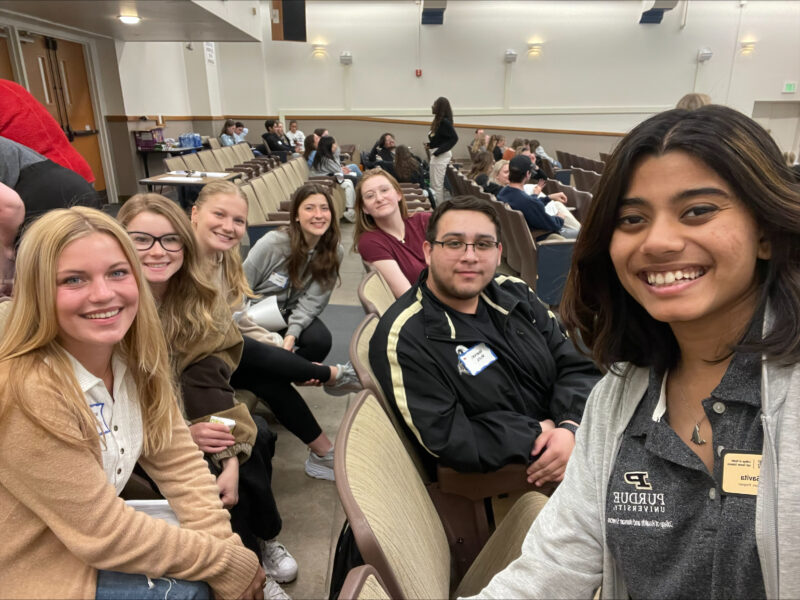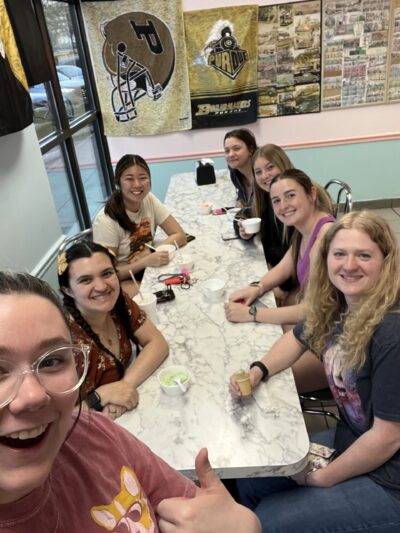‘Always there for you’: Purdue HHS Success Mentors program celebrates 10 years of enhancing undergraduates’ college experience

Nutrition science major Saniya Savita, right, snaps a selfie with some of her fellow Success Mentors participants.
Written by: Tim Brouk, tbrouk@purdue.edu
More than 8,000 miles away from her biological family in India, Saniya Savita arrived at Purdue University not knowing anyone. She was on a huge campus in a new country with about 40,000 students. In this exciting and somewhat overwhelming new setting, she worried about not only her academics but how to make new connections outside of the classroom.
But soon, Savita would meet her Boilermaker family through the Purdue College of Health and Human Sciences’ (HHS) Success Mentors program, which pairs first-year students with continuing HHS students as their mentors. Throughout that initial year, Savita and her mentor, Bailey Foster (HHS ’23), bonded over coffees, walks and study sessions. Now a junior in the Department of Nutrition Science and feeling much more at home in West Lafayette, Savita has given back as a mentor herself, and she is now a member of the HHS Success Mentors’ Core Leadership Team.
“This entire family that we have, the past three years that I’ve been a part of HHS mentorship, I’ve seen it grow and get better so, so much,” Savita said. “Everyone is connected very well. It’s so much fun to have a family like that, and I can’t wait for our new mentors to get assigned their mentees this fall.”
Now in its 10th year, HHS Success Mentors has provided hundreds of first-year students with an immediate first hand connection to HHS which has helped them become engaged leaders within the college and on campus. As is often with HHS students, the urge to help and give back has kept the number of mentors plentiful. The mentor program is designed for each mentor to be assigned two first year mentees that they touch base with each week. These touch points may be in the form of a text message, social media direct message, phone calls, Facetime, virtual meetings, attending various campus and community events or just grabbing a meal together.
Successful numbers
Within HHS, Heather Dykes, director of HHS student services, Kendra Coons-Oborne, senior student program coordinator, and Shane Hawkins-Wilding, senior director of student services, have grown the HHS Success Mentors program from less than 100 total student participants in 2013 to almost 500 participants for 2023-2024 — almost 10% of the HHS undergraduate student population. A recent internal study found that 77% of all participants felt connected to HHS and that mentees earned a higher first-year GPA than those students who chose not to participate.
From its inception, HHS Success Mentors’ objectives have been to create a sense of belonging for students while helping them navigate their first year of college. The program succeeds in meeting these objectives by the work of 24 upperclass students who form the Core Leadership Team and a trio of Senior Core Leadership Team members. Together these leaders work to supply academic support, psychological/emotional support, goal setting and career path knowledge and role modeling – all with the purpose of helping all participants find their own success in HHS and at Purdue.
“I think our program helps provide our students with a sense of belonging — a connection to our college as whole; the faculty, staff and most importantly from the mentees perspective another student who has walked their path already,” Dykes said.
‘Like having a big sister or big brother’

Silver Dipper is a popular Success Mentors bonding spot.
Mentees are matched with their mentors based on numerous criteria. The top connector is major of study, but where they are from, career aspirations, hobbies and even if they have younger siblings are also considered.
Ashlita Lodha hit the jackpot when Eva Taylor became her mentor. Taylor, only one year older, was a fellow Department of Health and Kinesiology major, who had many of the same classes a semester or two ahead of Lodha.
“She did such a great job of helping me adjust to campus, especially me being an out-of-state student,” she said. “It’s almost like having a big sister or big brother that’s always there for you. They’re going through the same pathway, just a year or two years ahead.”
Lodha and Taylor’s bond went far beyond anatomy or physiology class. From trips to Starbucks or Silver Dipper, Lodha and Taylor shared aspirations, fears and struggles. The experience was so formative for Lodha that she signed up to become a mentor with the goal of making her mentees feel as at home as she did during her first year. And while cones of blueberry cheesecake and Superman ice cream are great most anytime, sometimes you must rage. Lodha planned an outing with a small group of HHS Success Mentors students to Outrage Smash Therapy in Lafayette during a recent finals week. The students destroyed glasses, dishes and electronics in a safe but satisfying environment to help reduce stress levels from a rigorous semester.
“We were planning it for three, four months,” Lodha remembered. “I know I needed that break. I can’t be in academics and talking about school 24/7. It was nice to go hang out and do something completely out of the ordinary.”
Why join?
According to recent data, almost 80% of students credited HHS Success Mentors with helping them attain their academic and career goals. Mentors don’t stop learning and growing once they graduate from mentee status. Isaac Williams, a senior in biomedical health sciences, learned skills through his mentorship that will help him beyond Purdue.
“While I helped them become confident in their success as college students, they helped me become confident in my ability to act as a resource and role model that they can look up to,” Williams stated. “I feel that through the process of being a mentor, I was able to gain new friendships with my mentees as well as valuable leadership experience that I can take forward into other opportunities.”
Williams’ approach to mentorship is to help his mentees get comfortable with the college experience. They are away from home for the first time. They are studying in new ways with more accountability. Williams and HHS Success Mentors are there to help alleviate such stressors.
“These comforts can include the beneficial information through programming events regarding campus life inside and outside of academics, a network of potential new friendships that can be made, and an initial companion and mentor that can help guide someone through the entire school year,” he said.
Discover more from News | College of Health and Human Sciences
Subscribe to get the latest posts sent to your email.